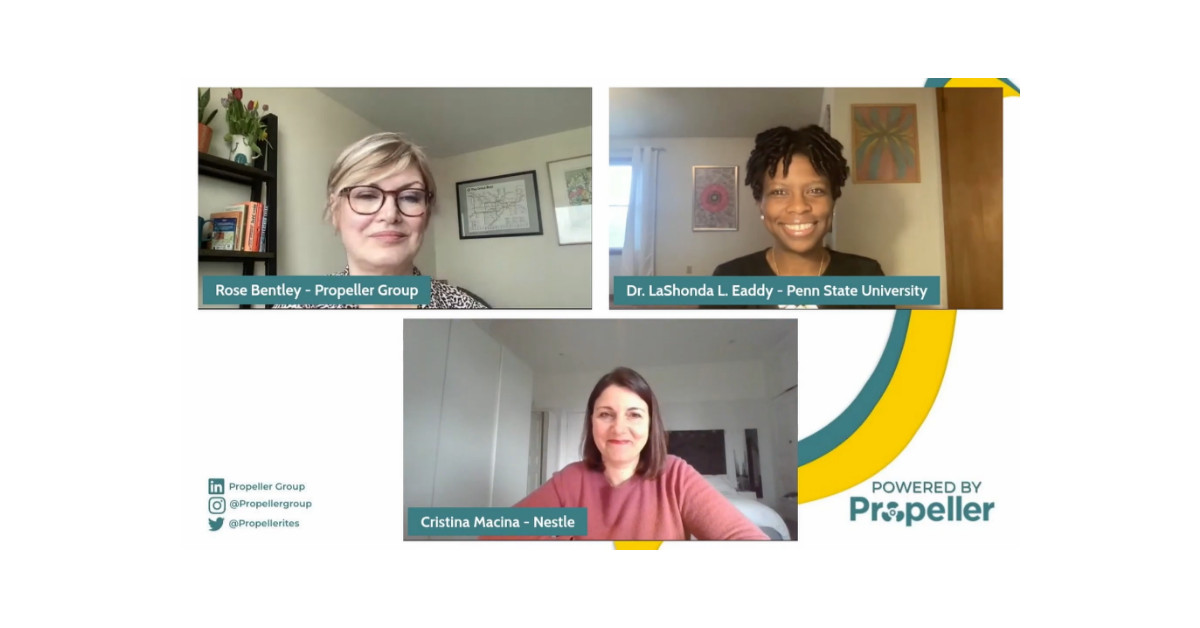Comms Club: The Big Issues: Beaming down into the boardroom: how comms professionals can prioritise PR buy-in

Communications professionals are expected to be consummate networkers and collaborators – bringing different branches of organisations together effectively is part of the job description.
Getting traction with the board is a different challenge. Businesses know their brand reputation is critical for growth and investment but it’s still tough sometimes to get the C‑suite to focus and make the right decisions on PR issues. PR specialists, as the guardians of reputation, have to use their superpowers to build influence in the C‑suite.
‘Comms Club: The Big Issues’ devoted a session to how communications professionals can achieve boardroom buy-in. The panel featured LaShonda Eaddy, Assistant Professor of Public Relations at Penn State University and Cristina Macina, Corporate Affairs Director at Nestlé UK & Ireland, and was chaired by Propeller Group’s Rose Bentley, Group Director of Clients & Strategy.
Bentley turned to the world of science-fiction to summarise PR’s relationship with the board: “If we – as comms professionals – are Captain Kirk or Captain Janeway, the board is often our final frontier for getting great things out into the world or containing a crisis.” The two parties are intrinsically linked – stakeholder management is a skill that has to be sharpened.
Know your audience
When it comes to influence, Eaddy said that developing relationships should be prioritised: “Getting to know the people around the table is an ongoing process and investing effort and time is necessary – as is demonstrating your credibility.”
Macina advised communications professionals to tailor their language to the audience: “When you know that stakeholders are driven by certain beliefs and ambitions – then use this [knowledge] in your dialogue.” Bespoke messaging enables a comms director to drive the point home. Another tip for persuasive point-making is to paint the picture of ‘what happens if we get it wrong.”
Communications professionals need to cultivate their reputation – expertise is a powerful tool to have in your arsenal, as is a positive track record. Positioning yourself as indispensable should be a priority for anyone that wants to gain influence over the boardroom.
Preparing for difficult conversations
Bentley outlined one of the big challenges for comms professionals: “There is the long-term ambition versus the short-term crises that bowl in and take us off course. How can comms professionals navigate this and keep the balance right?”
Macina advocated building a coalition of advocates ahead of any major meeting: “If I know that one or two colleagues will be supportive of a strategy – I would have the conversation before pitching to the entire board. Their vocal support could be huge.”
Eaddy spoke about the need for constant dialogue with colleagues: “Assuming that you have a seat at the table you should be able to have these conversations in the boardroom. You can provide your assessment on whether you need to dedicate resources in the short-term or not.”
It is important for PR leaders to demonstrate their worth – this is where comms and media training comes into play for executives. Macina argued that you should spend time “educating the board members. After they go through training they have more empathy and respect for the work of comms professionals.”This level of understanding is a great way to generate appreciation.” Bentley elaborated that training “is so valuable – businesses need to be ready for when the rubber hits the road.”
Taking a broad perspective
Macina was clear on the wide role played by the comms professional: “The most exciting part is connecting the wider organisation – we are very privileged to have a holistic view, to be connected with all elements of the business.”
Eaddy stressed that you cannot lose sight of the little things: “Coalition building remains vital. Your thoughtful groundwork can allow you to offer your contribution and share the soft skills that benefit your organisation.” She added that if these aren’t appreciated, “maybe that organisation isn’t the right place to be.”
Bentley felt that it was important to try and expand your horizons: “Make sure that you’re thinking about more than just communications – you need to understand the broader context of the whole business.”
Key takeaways to consider:
- Build relationships with the board. Knowing the stakeholders – and the language they respond to – is vital
- Getting to know the board is not a one-off exercise. This is an ongoing process
- Don’t be afraid to use worse case scenarios to your advantage. These can provoke the boardroom into action
- Keep your allies close to you. When pitching a controversial idea they can be the difference between success and failure
- Understand the broader context of the business – and play your comms agenda into it
To read the key takeaways from other Comms Club: The Big Issues sessions click the below links:
Keeping calm and carrying on in a comms crisis
Leadership life stories: How to craft a compelling narrative for your company
Can companies communicate both purpose and profit?
You can watch the full panel by clicking here.